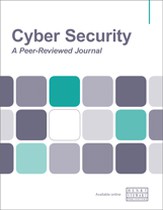Paradigm of cyber security transformation in Lithuanian Railways during a pandemic
Abstract
Cyber security is not a complete process, so businesses cannot fully ensure cyber resilience in their activities. Every business can be vulnerable, no matter how it is able to respond to the need for security, create a secure cyber environment and apply modern cyber security measures. Therefore, in a changing operating environment, it is very important to find the right balance to meet the needs of business through targeted cyber security measures, as well as to anticipate potential risks and prepare for preventive action. The study described in this paper focuses on the cyber security challenges, threats and adequate mechanisms for managing them during the COVID-19 pandemic. The main aim of the research was to measure the current cyber security state of JSC Lithuanian Railways (also known as LTG) with the following two objectives: 1) to evaluate LTG cyber security practices impacted by COVID-19; 2) to reveal LTG’s cyber security transformation. This paper analyses LTG’s experience in managing cyber security risks during a pandemic. The results of the analysis showed that it is important to identify the peculiarities of emerging risks and their impact on the business environment. Also, it is necessary to assess the possibilities of integrated application of organisational and technical measures aimed at eliminating or minimising the emerging risks.
The full article is available to subscribers to the journal.
Author's Biography
Antanas Kedys is Head of Cyber Security at JSC Lithuanian Railways (LTG). He is an experienced professional who previously worked in different IT positions and as a cyber security expert and now leads a team of cyber security experts whose daily tasks include protecting company assets and critical infrastructure from cyber threats, building security policies, monitoring of overall company security health, threat hunting, cyber risk measurement, incident investigations, and more. Antanas is also the company’s information security officer and go-to person regarding information or cyber security. He is responsible for managing security risks. Antanas presents cyber security issues and actively participates in conferences and cyber security events. He is also interested in new approaches and innovations in cyber security.
Žaneta Navickienė is Head of Business Safety at JSC Lithuanian Railways (LTG). She leads a team responsible for cyber security, personal data protection and corruption prevention. Žaneta is responsible for implementing targeted measures and managing risks in these areas. She values teamwork, collaboration and innovation in activities which she leads. She has more than 20 years’ practical experience in law enforcement. Žaneta holds a PhD in social sciences (law) and is a professor in the Public Security Academy, Mykolas Romeris University. Her interests are public security, crime investigation and prevention. She is the author of more than 60 academic publications and approximately 40 conference presentations.
Rolandas Šlepetys is Head of Safety and Risk Management at JSC Lithuanian Railways (LTG). He leads LTG’s safety and risks management area, which consists of seven divisions dedicated to various safety and risk topics and has around 100 employees. Rolandas is responsible for developing and controlling LTG’s safety, risk and security strategies and policies as well as ensuring that all LTG group employees are safe at work and business runs securely with measured and controlled risks. Rolandas is the author of several journal articles and textbooks related to crime and prevention, and teaches in the field of pre-trial investigation at Mykolas Romeris University.
